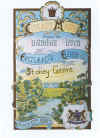| Stoney Grove Compiled by Emma Knytleigh from a variety of historic sources |
|||||||||||||
|
When the Australians stepped forth on the green lawns of Stoney Grove, surely there were many in the crowd who thought the spoken cry of a young village lad. "Why, they’re just men." It is not known whether he was expecting the native Aboriginal, or simply some supermen, for this was the team that had beaten the MCC in 1878, shattering the certainty of English dominance. William Hall, though having little recent opportunity to play himself, had gathered around him some of England’s finest with surely none finer than the Champion of England, W. G. Grace. The two of them strode together for the throw of the coin and the crowd cheered as, the toss won, Australia were invited to bat. If Bannerman reflects the sometimes dour attitude of the Australian cricketer, then Massie might be said to show the confidence of the new nation. For as one blocked and thought only of survival, the other shone upon the field, as every ball was met by a bold stroke. Sixty six runs were on the board in an instant, forty nine of them by Massie, before finally the guile of W.G. won through. By an unseen gesture young Reed moved from slip to leg, the ball tossed up with a mighty grunt and a sharp catch was taken, the batsman wondering if the fielder had sprung from the very grass. Now wickets fell with regularity, though still the score moved on, as both Peate, with his left hand floaters, and Studd took wickets. The Australian innings closed at 111, with a useful 28 contributed by the captain Murdoch. Though co-captain William Hall had not been called upon to bowl, it was noticed that he ran about most purposefully in the field and contributed greatly to the Australians’ rather low total. It being agreed that this should be a single innings game played over two days, the crowd was not surprised that at this point the game was stopped and both sides sat for dinner, where reports suggests much was consumed, much was drunk, and the tales were of great men and of great deeds. The sun blessed the Gentlemen of Stoney Grove for another day. As W.G. strode forth it seemed that nature had come together in a moment of perfection to reflect all that was best in the Empire. Indeed W.G., his right foot firm, struck the first ball for four. But his adversary was no pale youth, no, this was the "Demon" Spofforth whose legend had grown from his last visit to England, and surely the crowd held its breath as the next ball flew past W.G.’s bat into the gloves of Blackham. If some heard the click of ball on bat, then many swear they heard nothing but the great man’s epithet as the ball went past him. W.G. stood and stared at the Umpire. The Umpire said nothing, and the game continued. Only W.G. could stand up to Spofforth and though many came to the crease, they fell like leaves, undone by his fearsome breakbacks. If not for a timely contribution by Happy Jack Lucas, then all would have been for naught, but somehow the score progressed though 100 until it stood at 107 for 9 and even the wind dared not stir a breath. This then was the moment, for out stepped William Hall, not needed for his bowling but now called upon to stand firm while W.G. won the day. As the first ball came towards him he swung his bat in a mighty arc that would have returned the ball and the Australians to their homeland, but alas, no contact was made. W.G. conferred with his co-captain and, though no report of the conversation is known, Mr. Hall met the last ball of the over with a more circumspect stroke. Spofforth to Grace, an effortless strike and the game was tied. As excited boys looked at their fathers, older men nodded, it was to be all right. But the next ball was to become a local legend, pitched outside off stump it came back in and shattered the stumps. There could be no appeal, no call to the umpire this time. A great day’s cricket ended in a memorable draw. It is the humble opinion of this sportswriter that these men of Australia have great talent, yet surely on English soil they can never beat the best of this nation. And what of the umpire, whose ears failed to hear the touch that may have ended the Gentlemen of Stoney Groves’ hopes? He was later reported as saying, "The crowd came to see Mr. Grace, they didn't come to hear him."
|
||||||||||||

